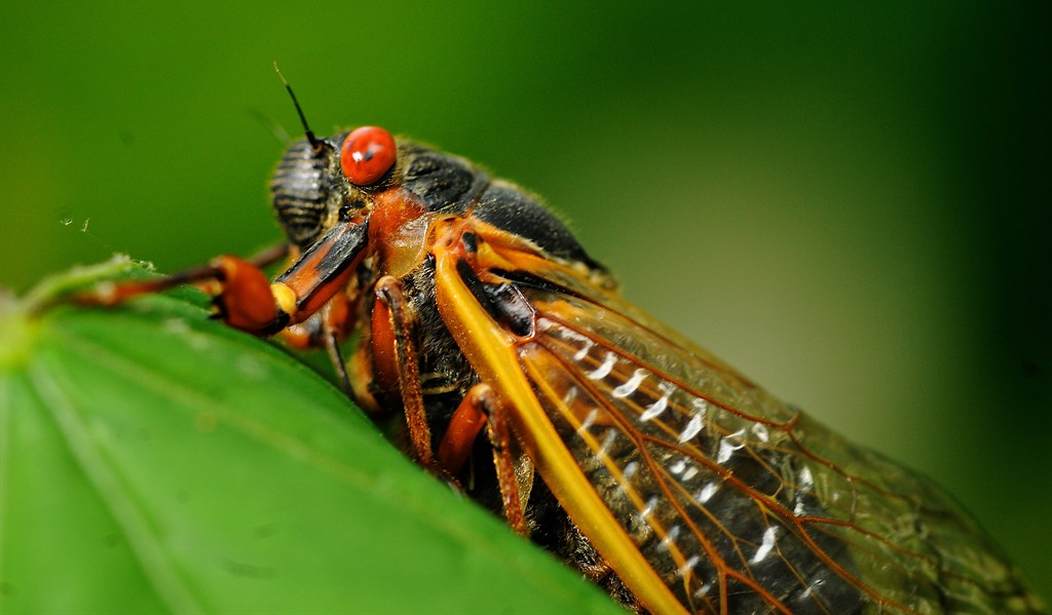Here on the East Coast, we’re anticipating the arrival of trillions of periodical Brood X cicadas.
So far, their emergence from a 17-year underground slumber has been described as a “plague” and an “invasion.”
The worst example of coverage, however, is the media's attempt to normalize human consumption of cicadas. Gross.
Why this, and why now? It’s obvious. Never let a crisis—in this case, Brood X cicada hysteria—go to waste. After all, animal protein substitutes are the key to saving the planet now. Or so we’re told.
Bug appetit? Under no circumstances will I partake in this bizarre culinary exercise. Neither should you, dear readers.
Recommended
Media Won’t Give Cicada Recipes a Rest
Entomophagy, or the practice of eating insects, isn’t a new concept. We largely refrain from doing it here in the U.S. And that’s okay.
But why does the media insist we now eat cicadas, and by extension, insects? Two reasons. The first being to discourage meat consumption. The second being to generate clicks and website traffic.
Washingtonian Magazine claims cicadas taste like shrimp, arguing, “If tuna is chicken of the sea, why can’t cicadas be shrimp of the sky?” (I’ll stick with eating shrimp, thank you very much.)
WBAL11 wants viewers to imagine cicadas as the perfect topping for bruschetta. (Barf.)
A WIRED article posited, “Brood X offers something beyond noise and wonder. Namely, it offers a source of free-range, no-cost, eco-friendly protein.”
Perhaps the worst take on cicada recipes comes from CBS Sunday Morning, after they published a cookie recipe from the "Cicada-Licious: Cooking and Enjoying Periodical Cicadas" (2004) cookbook.
Yes, you read that right: Cicada cookies, or “emergence cookies.” Here’s what the recipe calls for:
Emergence Cookies
Yield: 60 cookies
Ingredients:
1/2 cup shortening
3 eggs
1 1/2 cups sugar
4 oz. unsweetened chocolate, melted and cooled
2 tsp. baking powder
2 tsp. vanilla
2 cups all-purpose flour
An additional 1/3 cup sugar
1 beaten egg white
1/2 cup coarsely chopped nuts (optional)
About 60 parboiled dry roasted cicadas (roast for only 8 minutes so that they retain some moisture)
Ironically, a disclaimer about eating cicadas was included at the bottom in the article.
The University of Maryland and the Cicadamaniacs do not advocate eating cicadas without first consulting with your doctor. While many people do eat cicadas, there is no guarantee that they are safe for every person to eat. As with all foods, it is possible that certain individuals will have allergic reactions to substances within the cicada.
Whoops.
Don’t Eat Them. Let Nature Run Its Course
Many on the left are environmental preservationists who believe nature should be left untouched and undisturbed. So why are many of them entertaining cicadas recipes? Talk about inconsistency...
My fellow Americans also in the path of Brood X cicadas: Let’s leave them alone and allow nature to run its course.
What is their primary purpose? Procreation—not becoming a part of our omnivorous diet:
When Brood X starts to emerge in the coming weeks, the insects will have a singular goal: sex. Less than a week after venturing above ground, the male cicadas will begin their mating call. (Y'know, that super loud droning? A group of male cicadas can get up to 90 decibels or more, about the same as a motorcycle at 25 feet away.) One female can lay hundreds of eggs, then the adult cicadas die. The eggs hatch in about six weeks, and the baby cicadas (nymphs) burrow into the ground to start the same 17-year process all over again.
Cicada Emergence Signals Healthy Environment, Not a New Food Trend
While eating cicadas is not recommended, their presence is actually good for one thing: the health of the environment.
WTOP noted, “But scientists say the arrival of Brood X is a sign that despite pollution, climate change and dramatic biodiversity loss, something is still right with nature. And it’s quite a show.”
It added, “This is not an invasion. The cicadas have been here the entire time, quietly feeding off tree roots underground, not asleep, just moving slowly waiting for their body clocks tell them it is time to come out and breed. They’ve been in America for millions of years, far longer than people.”
This here is the only acceptable media angle for covering this subject.
Conclusion
As a child, I once ate a pill bug (a.k.a. roly poly). For curiosity’s sake, I wanted to know what it tasted like. (Verdict: it was disgusting!) And that was the end of my brief dalliance with bug eating.
I can stomach unique and delicious meat cuts like cow tongue and liver. But insects? Nope. Once was enough.
To my media colleagues out there normalizing cicada consumption: Kindly bug off and save cicadas for creatures that actually depend on them.























